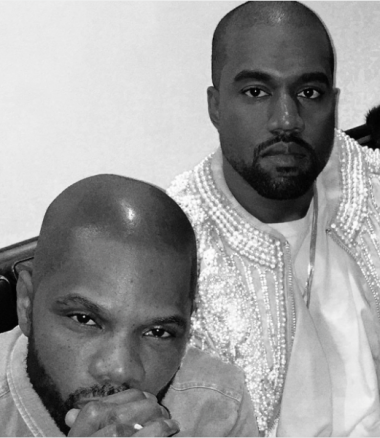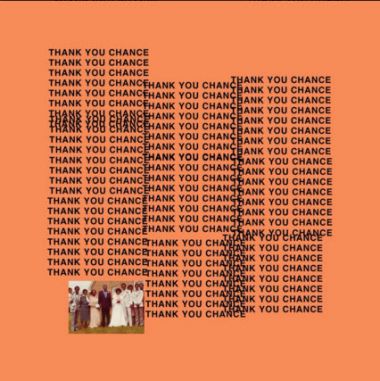Is Kanye West's The Life of Pablo really a gospel album?

Kanye West's latest album, The Life of Pablo, is finally available on all streaming platforms and has become the first to top the Billboard 200 with most of its units coming from streaming.
Prior to the initial upload of the album on Tidal, West tweeted: "This album is actually a gospel album" and the album title itself has links to the apostle Paul. Further references to Paul's journey and West's own faith can be interpreted in the lyrical content throughout. We've had a listen to find out what the most significant references are to Kanye's faith and Christianity.
Ultralight Beam - The initial references to faith come from the first track on the album. Ultralight Beam begins with the audio of 4-year-old Natalie Green and her mother Samoria Green praying. The short clip was originally uploaded by Samoria to Instagram and attracted the attention of West. Natalie can be heard saying: "We don't want no devils in the house, God. We want the Lord and that's it" as her mother responds: "Yes, Lord. Yes, Jesus". This is the most heavily faith influenced song on the entire album. Each section features direct references to Christian themes, and the title, which is repeated as part of the hook, alludes to Paul's conversion (Acts 9). Musically, the addition of Kelly Price, a gospel choir and an auto-tuned organ-like instrument further feed into the sound. Gospel artist Kirk Franklin also features.
Father Stretch My Hands Pt 1 - Here the use of the word "father" is a reference to God and the "stretch my hands" conjures up the image of hands fixed in prayer, and submitting to God's will. The intro: "You're the only power that can. You're the only power that can. Father," comes courtesy of Pastor T.L Barrett but despite a strong start, the faith influences swiftly fade. The song is mostly about one of West's relationships.
Father Stretch My Hands Pt 2 - Part One began with the focus on God, the Father, and Part Two the meaning turns to West's earthly father who left him and his mother when he was a child. It returns to comes to a close with the lyrics "How can I find you? Who do you turn to? How do I bind you?" and the return of the vocals of Pastor T.L Barrett.

Low Lights - West's vocals don't feature on this at all. The audio comes from a track recorded by producer Sandy Riviera but the vocalist is uncredited. It details a woman's testimony and ends with the words: "Oh Lord, thank you, you are the joy of my life".
Highlights - He mainly reflects on his achievements in this but he also talks about his beliefs and the struggle of believing in God when bad things happen. The line: "Even though they know Yeezus is a Christian hah?" sees West openly identify as Christian.
Feedback - As the hook, "Ayy, y'all heard about the good news?" is repeated several times throughout Feedback. On the surface, the song is mostly about West's success but considering his faith, the influences of the Apostle Paul and the hip hop's culture of double entendres, it's likely to also be symbolic of the Gospels.
Wolves - The last song which explicitly showcases the biblical influence on West's material begins with ethereal sounding singing which mimics the howling of wolves. The rapper's second verse includes the lines: "You gotta let me know if I could be your Joseph," a reference to Joseph, Jesus' father on earth, and being a faithful husband, and "Cover Nori in lambs' wool, we surrounded by the ******* wolves". It's likely that West drew inspiration from Matthew 7:15 (Watch out for false prophets. They come to you in sheep's clothing, but inwardly they are ferocious wolves) for this song and these words in particular which are adapted later on to include his son, Saint. Sia provides additional vocals and the line "I found you, oh Jesus" features in her verse.
So how accurate was the rapper's "gospel album" claim? West always endeavours to go against the grain in all areas of his creative output, be it his music, production, footwear designs or catwalk collections. This boundary-pushing attitude will cause many to conclude that The Life of Pablo's Christian symbolism and West's proclamations are all part of a calculated ploy to generate interest in and controversy around his latest release. While in part this may be true, it's too simplistic an interpretation of the material, of West as an individual, and of his creative process.
The Life of Pablo's Christian samples and references do sit uncomfortably beside the sexual content and swearing, but this juxtaposition is in a way reflective of West's own life and faith – conflicted, confused and seemingly incompatible. This is something West alludes to on Ultralight beam: "I'm tryna keep my faith. But I'm looking for more. Somewhere I can feel safe. And end my holy war."
Listeners will definitely get a sense that West wants to start a new conversation about God, and possibly show dedication to Him through his art, but often the end result is him only being truly sincere about glorifying himself and his own achievements.
In Jesus Walks, West's iconic single from 2004, he raps: "So here go my single dog, radio needs this. They say you can rap about anything except for Jesus. That means guns, sex, lies, videotape. But if I talk about God my record won't get played, huh?". Could West's inability to commit to making an authentic gospel rap album be down to fears that doing so would alienate his audience and jeopardise his success?
The album as a whole can certainly be viewed as symbolic of West's personal faith conflict in which he's wrestling his ego, his lifestyle choices and his need to put God first. He's professionally and personally struggled with being second best and submitting to anyone, so it's not really a surprise that this appears to be something that he has difficulty doing when it comes to God and his music. This battle is one that he's fully aware of. In February he tweeted: "My number one enemy has been my ego...there is only one throne and that's God's".
Despite some lyrical content which openly explores faith struggles and references major figures and concepts of Christianity, seven faith-inspired songs out of 19 does not a gospel album make.
It turns out that West is yet to use Christian symbolism in his creativity to serve something greater than himself. With all the explicit language and references, the majority of Christians will disagree entirely with West's assertion that his latest offering is a gospel album. Nonetheless it's undeniable that his faith - albeit confused faith - has, once again, heavily influenced the sound and the concepts behind a number of the songs on this album. Listen at your own discretion.











